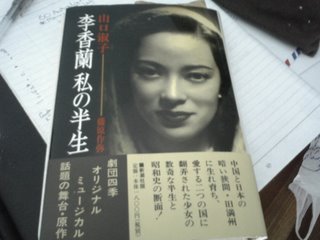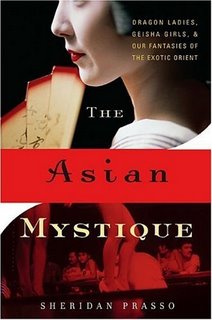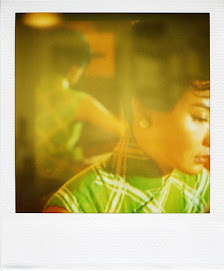BOOK I HAVE READ:  BOOK: Coming Out in Japan
BOOK: Coming Out in Japan
This is an autobiography by a middle aged Japanese gay man about his experiences growing up gay in the 1960s and 70s in Tokyo right till when the book was published in 1993. He published a subsequent book in 1994 with his partner which detailed life living together as a gay couple and also included bits about his partner's experience of growing up gay. This book gave me an insight into what it was like being gay in Japan in an era vastly different from now, where it isn't as bad as it was. I was also profoundly touched by the fact that both their mothers accepted their sons being gay and their relationship despite being in their 70s and not being able to comprehend what even being gay meant....nice book and available from the State Library of Victoria.
BOOK THAT I AM READING: BOOK: Li Xiang Lan, My Life 李香蘭﹐ 私の半生
BOOK: Li Xiang Lan, My Life 李香蘭﹐ 私の半生
I bought this autobiography about the most famous wartime actress Li Xiang Lan whilst in Tokyo last yr so that i could improve my Japanese skills through reading as well as my interest in WW2 and Japan.
A brief background history is needed for some of my readers i think. In 1931, north-east China was invaded and occupied by Japanese forces and a puppet state of 'Manchukuo' was set up. The last emperor of China, Pu Yi, was propped up as the leader but in reality Manchukuo was controlled by the Japanese Kwantung Army. The Japanese government encouraged Japanese migration to Manchukuo and eventually came up with a policy to populate Manchuria with at least a 1 million Japanese settlers.
Yamaguchi Yoshiko's family was one of them. She was born and brought up in Manchuria and whilst speaking japanese at home, attended chinese schools. Thus she could speak fluent Mandarin. In 1938, she was selected by the newly established Manchurian Film Corporation (ManEi) as a new film talent to star in its propaganda films. ManEi itself was set up by the Japanese forces as a propaganda tool. It was decided that she should adopt a Chinese persona, being Li Xiang Lan, as it was good propaganda to show a 'Chinese girl' showing such goodwill towards the Japanese. Thus Yamaguchi Yoshiko became Li Xiang Lan and she appeared in all the films and in public as Chinese and almost always wearing the Chinese dress. This is why even today, many Chinese and Japanese people mistakenly assume that Li Xiang Lan was a Chinese when she was actually Japanese.
The films she appeared in were all propaganda films which justified Japanese aggression in China. The storylines invariably went something like this:
Li Xiang Lan portrays a Chinese girl (can be interpreted as representing weak irrational feminine China) who hates the Japanese as they killed her parents and burnt her house. She meets a kind Japanese man (can be interpreted as representing strong rational masculine Japan) who corrects her wrong ways of hating Japan and she falls in love with him in the end. The films all sought to justify Japanese aggression in China as being righteous and Chinese hatred of the Japanese as being irrational and misguided. This included her most well-known film 'China Nights' 支那の夜 which ultimately got her tried for 'treason' 漢奸罪 after the war. However she was released when it was revealed that she was Japanese and not Chinese. She was deported from China after release.
Although Manchuria was supposed to be a paradise for the five races (Japanese, Chinese, Manchurian, Korean, Russian), in reality, to borrow a line from Jung Chang's epic autobiopic 'Wild Swans' , 'If Manchuria was supposed to be paradise, then it was clear that it was only a paradise for the Japanese.'
Excerpts from Li Xiang Lan's autobiography also indicate the discriminatory nature of Manchurian society then despite being Japanese herself:
'I was payed 250 yen whilst the most popular Chinese actress only 40 yen. The other chinese were only given 20 yen. After the new japanese director came, he decided to lift the chinese actors wages as he could not justify the huge wage gap.'
'I did not have any problems using a Chinese name, working with Chinese people and appearing in Chinese language films. I also always thought that it was only natural for all the races to live in harmony in the vast mainland of Manchuria....however the Japanese in Manchuria thought otherwise. They discriminated against the Chinese in every aspect of daily life. For example, at parties and dinners, although we all ate together and drank the same wine, the japanese got white rice and the chinese would always only get low grade coarse rice. I could never undertand the reason for such a discriminatory practice. Why was it that although we all worked together day and night, there was such differential treatment towards the Chinese?'
' I had always dreamed of going to the motherland Japan, the country of advanced technology. The first time i got to go was as the Japan-Manchuria Goodwill Ambassador with Meng Hung. We arrived in Shinomoseki and waited with the other foreigners as the customs officer dealt with the japanese first. As i was travelling with Meng Hung, i waited with the other foreigners too. When it came to our turn, Meng Hung was allowed to pass swiftly and i expected the same too...however the customs officer after seeing my travel documents said ' Aren't u Japanese? As a citizen of a first-class country, why are you speaking the language of a third-class country and wearing the clothes of a third-class country? Aren't you ashamed? If you are a Japanese citizen of Imperial Japan, please speak Japanese!' I was so ashamed and disgusted that i left swiftly holding Meng Hung's hand, the poor girl, not understanding what was going on'. After that incident, my image of my motherland Japan and the Japanese people fell significantly, i thought to myself, what a racist country Japan and the Japanese were! looking down on Chinese people like that!'
A nice autobiography and still working my way through it...
BOOK THAT I INTEND TO READ:

BOOK: Asian Mystique
Came across this book on someone's blog and i found it was interesting....so i am planning to read it next....




4 comments:
you read Japanese?
lawboycool: I have been learning Japanese since Form 1 all the way till university..did japanese in uni too and went to Tokyo for exchange last year at Keio University (which is where Japan's PM Koizumi went..)...actually go to my archives and u will see that i started this blog in Japan...so yeah, i read Japanese, knowing chinese characters most definitely helps!!
hi!
Coming Out in Japan,この本のことは知りませんでした
日本では一部の世界(芸能界など)ではゲイであることは認められているけれど、その他の場所ではComing Out するのは勇気がいるでしょうね
李香蘭﹐ 私の半生,この本は知っていますが、読んではいません
でも、山口淑子さんには大変興味がありますね、私の母は彼女の大ファンです
私は、一度彼女が国会議員の時にあるホテルのロビーで見かけたことがありますが、とても美人でした
あなたの解説を読んで、この本に興味を持ったのですが、同時代の女性、愛新覚羅 浩の自叙伝「流転の王妃の昭和史」という本が書棚に眠っているのを思い出しました
ご存知でしょうか? 李香蘭のように数奇な人生を 'Manchukuo' で過ごした女性、The last emperor の弟と結婚した日本の貴族の娘です
こちらから詠んでみることにします
kimcafe:はい、知っています。。先年、朝日テレビ彼女についてのドラマが出って見ました。常盤貴子 主演するようです。お母さんは彼女の大フアンですか?本当?すごい。。だからお母さんは戦争の時代に過ごす経験があったね。私は大二次大戦と日本のことは興味が持っていますよ。。。
Post a Comment